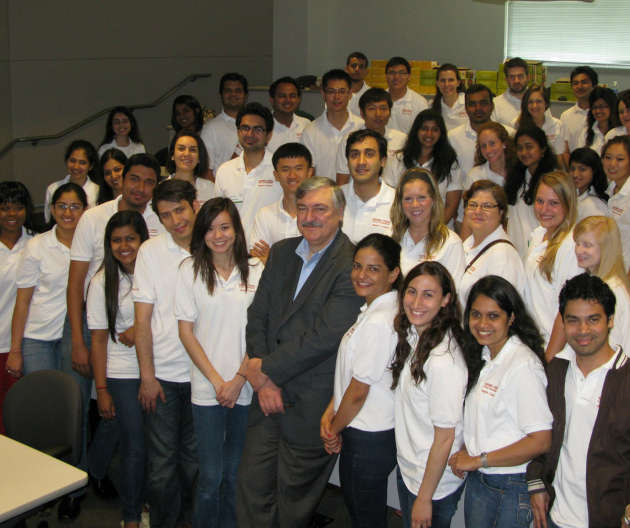
I had the pleasure of leading a wide variety of organizations while I was at UT Dallas. My freshman year, I worked with a team of five students; my senior year, I was leading the Dean’s Council with 30 council members. Each year I learned new things about leadership as I worked with different types of students and different organizational setups, but one of the most important lessons I learned was how to delegate.
When we first started the JSOM Book Club, each of us five officers had very specific roles to fill. We needed five officer positions to create a student organization, and we had a group of five honors students to do the work. I didn’t have to do a lot of ‘leading,’ since our officers were all self-starters who knew what they had to do.
The following year when I worked with two other friends to set up the TEDxUTD Club, we found ourselves with a different type of organization. Because of the brand name, it was easy to find a lot of students who were interested in being involved. However, also because of the brand name, my two friends and I were incredibly cautious about following the TEDx rules. There are a variety of guidelines from the TED organization that go along with producing a TEDx event, such as what percentage of the event can be videos versus original talks, and how many people were allowed at an event.
Leading without Delegating
We were very worried about protecting the TEDx name, and ensuring our event was high quality so that we could keep TEDxUTD on campus. Because of this, my two friends and I were very hesitant to let other students get too involved. We had meetings with the rest of the interested students to get feedback, but then our leadership team of three took on all of the planning work. We worked to lay out the specifics of what had to get done and then asked for volunteers to fill the roles needed for the day-of.
After our first real TEDxUTD event, we were so thankful for the club members who stepped up to the plate and took on more challenging tasks as we needed the help. At this event, we wondered what we had been worried about the entire time. Our club members were awesome, and we really should have trusted them to take on larger roles, and delegated the work. Our members wanted to play larger roles, and we should not have held them back. All three of us ended up leaving the organization the following semester, but with the new organizational structure, it looks like TEDxUTD is doing phenomenal.
Later, when I was appointed as the Undergraduate Leader of the Dean’s Council for a year, I recall my first semester being a little rocky. Our organization already had a clear goal to accomplish that was set the previous semester: to put on a student organization fair. Well, it would be my job to figure out how we were going to do that. I remember the day that I got elected — I was elected at the start of the meeting, but we still had another hour to go before the group would be dismissed and not meeting again for a month. I remember standing in front of my 30 peers and trying to create a to-do list of what needed to be done before the next meeting. And then asking for volunteers. Not many people had anything to contribute.
Hindsight is 20/20
At the time, I was not prepared to lead an open discussion with a group of 30 people — I’m not sure how professors manage it! If I had to go back, I would have divided up our organization into manageable groups, who could discuss the ideas among themselves and then bring the best ideas to the table. This way, more students would have been able to contribute to the discussion. It would have given more people a chance to participate, rather than me expecting people to just start shouting their ideas.
However, even once a to-do list was put together, it was still difficult to get volunteers to do the work. At the time, the Dean’s Council had three leadership roles: the Leader, the Secretary and the Webmaster. When you ask a group of 30 people to volunteer, it’s difficult to know everyone’s individual skill sets, and you have the attitude of “Someone else will volunteer.” Not knowing how to deal with awkward silence, I usually ended up volunteering myself to take care of a majority of the tasks. I signed myself up for probably a lot more than I needed, which could have been divided to give other students a chance to reach out to faculty or develop event-planning skills. Council members were showing up to the monthly meetings but were not contributing outside or back to the University. I had to find a better way to delegate tasks, especially among less-vocal members.
I learned a lot my first semester as Undergraduate Leader, and once our event was over, I put a better plan into action. I realized that work needed to be better delegated, so I broke the council into much more manageable committees. Each committee would be focused on its own project. Not only did we accomplish more goals that semester, but the students were better involved in the organization, and more people gained leadership skills as Committee Leaders. With smaller groups, council members were more accountable to participate more actively. More students could have a voice.
Learning to Delegate and Beyond
Even at my current job, I am seeing the importance of learning to delegate. I have been on projects that have been well-delegated to different staff members, and other projects where it’s difficult to tell what your individual role is. Figuring out how to delegate is a recurring challenge that I not only saw throughout the University, but I am now seeing in the workforce as well. As I am put into more leadership roles within the firm, I expect my experience on campus will help make my teams more productive. Learning to delegate is a valuable leadership skill to have and one that I plan to continue working on.






